11/10/2016

CAROL
Film analysis part 2


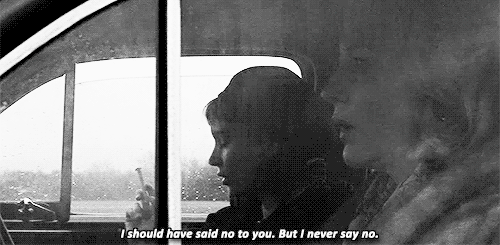


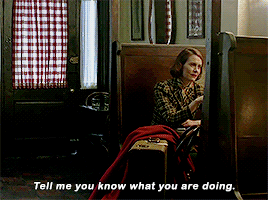
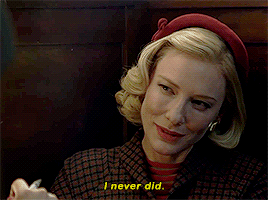
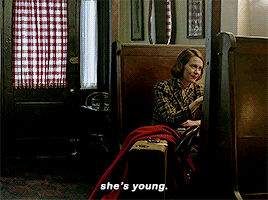
"we don't know why we're attracted to some people and not to others all we know is that we either are attracted or we're not."


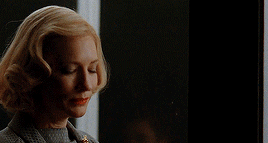
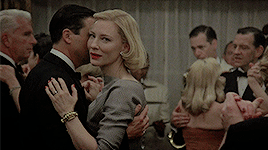
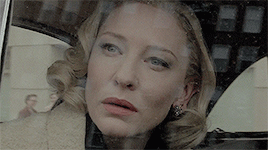
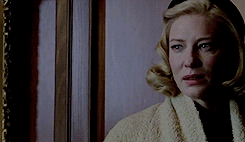

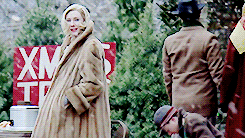
Throughout 'Carol' Therese struggles internally with her instinctive capacity to harmonize with the world around her. This is most noticeable in one of the first scenes where Carol and Therese sit and have a conversation.in this scene Carol orders her lunch before Therese has even looked at her menu. When Therese realizes Carol and the Waiter are waiting for her to order she closes her menu and says "I'll have the same" and then a few moments later when Carol asks if marrying Richard is something she wants, Therese makes light of it by saying "I...barely know what to order for lunch.". This scene is particularly special because of what the dialogue reveals about who Therese is at the beginning of the film. She is a submissive person in a society that thrives on conformity. Therese makes note of this later in the film when Carol asks her what she's thinking and Therese says " I never say no. And it’s selfish because I take -everything. Because I don’t know -anything. I don’t - know what I want. How could I when all I ever do is say "Yes" to everything?". Therese sees her capacity to conform and say yes to everything as a weakness, a flaw, not an strength.
This character flaw is displayed very early on in the film. When we meet Therese she's working at Frankenberg's and is in a long term relationship with a man who loves her, yet she still seems
unhappy. There's a scene where just after she and Richard ride to work on his bike they get into a line of employees leading into the building. As they inch closer, a man who is handing out Santa hats to each employee can be heard repeating "Compliments of the season from the management" to each employee. The employees in this scene bare an unequivocal resemblance
to an assembly line and that is a nearly direct representation of the behavioral expectations of the 1950's. They get in line and are handed a hat that's supposed to be festive and represent joy but it's not a hat they get the choice to wear, thus the joy they are conveying isn't genuine it's forced.
In the next scene Therese sits in a room full of employees and it seems as though she's the only one not wearing a hat. Everyone is talking but she is not, instead she sits alone reading a Frankenberg's employee handbook, the top of the page reading "Are You Frankenberg Material?". she runs her finger across the edge of the page, a line of text reads "must at all times maintain a clean, hygienic, and moral appearance.". These small details make her stand out from her surroundings, they visually show us her internal struggles with conformity. Even upon meeting Carol when she is told that shopping makes her nervous, Therese responds by saying "that's
ok, working here makes me nervous". Even though she's living in this world where she's constantly being told how to act and what to say she still finds a way to be a vulnerable, authentic human being.
"Some people change your life forever" is a very fitting tagline for 'Carol'. There are a few noticeable behavioral contrasts in the characters between the beginning and the end of the film. Initially Carol is the character who exuberates the most confidence. When she meets with Abbey and tells her she's going away for a while, Abbey says "She's young, tell me you know what your doing" and Carol replies "I don't, I never did.". Even when she is unsure of the the outcome she continues on with confidence. In an earlier scene there's a moment where Carol is standing alone by a window at a party when a women approaches her with a cigarette telling her to look out for her husband who doesn't want her to smoke anymore and Carol says "so what, you like it". She's very independent, confident, and makes her own choices all the way up until she must return home from the trip. When she meets with Therese in the bar at the Ritz it's almost as if the two have switched places. Therese was always the vulnerable one and now it's Carol who is beating around the questions and nervously smoking a cigarette. When Carol asks if Therese will come and live with her, she presents it in such a different way from the usual. She says "I was hoping you would come and live with me" and quickly adds "But I guess you won't". Therese who has always said yes to Carol answers by saying "oh, I don't think so". It's immediately clear Therese is no longer the vulnerable one, she quickly says "no" when Carol asks "you’ve suddenly blossomed. Is that what comes of getting away from me?". She says it with such precision, lacking her usual slight hesitation. Earlier in the film while watching a movie Dannie says "I’m charting the correlation between what the characters say and how they really feel." This is a direct reflection of the way characters communicate in this film. When Therese says "No" she's actually shutting down the slightest idea that what she had with Carol was in anyway a hindrance to her.
The idea that you don't get to choose who you love comes to mind very often while watching 'Carol'. This is actually discussed in a earlier scene when Therese is talking with Dannie and they have a conversation about attraction just before he kisses her. He says "we don't know why we're attracted to some people and not to others all we know is that we either are attracted or we're
not." and Therese says "not everything is as simple as a bunch of pin balls reacting off of each other". There's another scene near the end of the film where Carol is meeting with Harge and their lawyers just after she's seen Therese walking across the street wearing red. This scene holds the best monologue in the film and within that monologue Carol says "There was a time when I would have done almost anything. I would have locked myself away to keep Rindy with me. What use am I to her, to us, if I'm living against my own grain?" It is one of the best moments in 'Carol' because it represents so much. In this scene Carol is publicly declaring her feelings for Therese, she's sacrificing her relationship with her daughter and it's extremely brave but also heartbreaking at the same time. As much as she loves Rindy she also has a realization that she's no good to her if she cannot be happy and living a life where she feels most at ease. Harge's reaction to Carol in this scene is equally emotional and it's evident that as much as we want to cast him as a villain in this story, it just doesn't work.
Somehow by the time we reach this point in the film, Harge comes across as a man who just wants his life to go back to the way it was at some point. He's believable when he tells abbey he loves her, he loves Carol so much it's hard for him to let her go and he jumps at every chance he gets to keep her around, even using custody of their daughter as leverage. The interesting thing is that these two character share a lot of verbal parallels. Earlier in the film when Carol and Harge argue while Rindy is in the car he says "If you don't get into that car right now, then..." Carol cuts him off saying "Then what? It's over?" and he looks at her and says "You were never cruel" which prompts Carol to apologize. This dialogue is very similar to the dialogue used in the lawyer meeting at the end when she gives Harge an ultimatum about Rindy and says "So that's the deal. I won't, I cannot negotiate anymore. You take it or leave it. But if you leave it, we go to court. And if we go to court... it'll get ugly (holding back tears) and we're not ugly people, Harge". These two characters are constantly reminding each other of who they were when they were together and that too is heartbreaking. Everyone in this film becomes a victim of some circumstance that is much greater than themselves. Harge is is loosing his wife, Carol is having to choose between being with the person she truly loves and raising her daughter Rindy, Therese is left heartbroken after Carol leaves her in Iowa. This is the part of the film where full circles begin to form.








